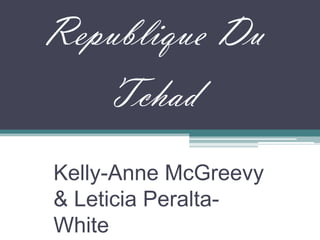RepĂşblique du tchad
- 1. Republique Du TchadKelly-Anne McGreevy & Leticia Peralta-White
- 2. LocationSurrounding Countries:Libya, Sudan, Central African Republic, Cameroon, Nigeria, andNiger, Capital: N'Djamena N’Djamena founded in 1900 and suffered from war.
- 3. Some people are very sensitive to abuse.
- 4. N’Djamena located on top of CameroonColonization1891 – French in ChadChad under government controlChad in WWIIAugust 11, 1960
- 5. Zakouma National Park1,200-square-mile national park There are large herds of elephants, lions, giraffes, wildebeests, monkeys, and a wide variety of antelopes and birdlife.In 2006 there was the Zakouma elephant slaughterThere are racers who come from the Tibesti mountain regions for Camel Racing.
- 6. LanguageMain Languages: French and Arabic100 + spoken languagesReligion: About half of the population follow Islam, while some 30 percent are Christians, 20% other religions.Chadian DietsThe diet consists of boule, a stiff porridge made of millet and sorghum.They usually eat milk and dates; no safe water; Fish is common in the north“Vampire“ is a traditional dish made from animal blood and liver.Chadians also enjoy mutton, goat and chicken
- 7. Everyday CultureChadian people show interest by listening intently.They also consult a third person in solving conflicts.People from Chad never shake with dirty handsInstead of knocking, they will clap their hands together 5 times, loudly.
- 8. Culture (Continued)Greetings and Hand/Body GesturesNo shorts for menWomen often wear long dresses and turbans.
- 9. Beignets – Donuts!½ cup d’eaubouillante¼ cup du beurre½ cup de la farineDeuxoeufs1 tsp extrait de la vanille
- 10. Ah Bon? What would a Chadian do to see if someone was at home? What do women often wear? Do people from Chad talk during dinner? As a colony, what was Chad used for?What are a Chadian’s main diet?Which religions are most predominate?Name two types of animals found in Zakouma National Park.Name at least three of the six countries surrounding Chad.
Editor's Notes
- #3: The capital N'Djamena is a new town, founded by the French in 1900 as Fort-Lamy. It suffered huge damage in the 1980–1982 war instigated by Hissen Habré. Because of continuous immigration and the influx of refugees from the civil war period, the city has grown rapidly without a proper expansion of services and infrastructure.On etiquette: except that respect for community elders, moderation, and reserve in public life is universally appreciated. Some groups are very sensitive to verbal abuse and insult, which can lead to serious personal conflict. Traditional community standards and values are in decline, since in the past decades social life has been subverted by civil war and communal conflicts, which in turn allowed violent behavior to be an acceptable mode of expression for many young people.
- #4: The French first penetrated Chad in 1891Chad was placed under governor control. Used as a source for cotton and labor.During World War II, Chad joined the Allies after the defeat of France by Germany.On August 11, 1960, Chad became an independent nation.
- #6: French and Arabic were chosen as the official languages of the state— both long established in Chad but neither of them indigenous.Linguistic Affiliation. There are more than 100 languages spoken in Chad, virtually all belonging to two great languages families: Nilo-Saharan and Afro-Asiatic. The precise extent and variety of the linguistic situation are not known, because of a notable lack of research. Language does not overlap with "ethnic group" identity, as some languages are spoken by groups identifying themselves with different ethnic/regional labels. Arabic, Sara, and French are widely spoken, the latter used in education and the administration, especially in the south. The use of Arabic, traditionally an important commercial language, is expanding across the country.Religious Beliefs. Two religions predominate in Chad: Christianity and Islam. About half of the population, and particularly in the northern and eastern parts of the nation, follow Islam, while some 30 percent are Christians, who are concentrated in the south and among formally educated people. A further 20 percent, mainly in the south, adhere to traditional religions, most of them not well known. Across the spectrum, traditional local beliefs and cults are important, often in conjunction with one's allegiance to the Islamic or Christian faith. Ancestor veneration, belief in certain spirits, use of oracles and divination, and ideas of fertility and cosmic harmony are central. The discourse of "witchcraft" is not prevalent in Chad as compared to, for instance, central and southern Africa.
- #8: Instead of laughing or smiling during an awkward conversation, which most Chadian people think is extremely inappropriate, Chadian people have the tendency to demonstrate their listening by their serious expression and intent listening. Chadian people usually consult a third party to help resolve conflict. Sometimes these mediators are used in martial disputes, disagreements between neighbors, etc. This third party person also must be someone of equal status or position.If your right hand is dirty or wet from working, (you will never use your left hand after you have gone to the bathroom,) then you will offer your wrist instead. If the other person’s hands are also dirty, then you will shake wrists instead of hands. If you want to see if someone is at home, stand a little ways from the door, and clap your hands together 5 times, very loudly. In Chad they do not normally knock on the doors of houses.
- #9: While shaking hands with a Muslim, they will touch their hands to their heartInstead of saying “I am listening to you,” they will raise their eyebrows up once.Men should never walk around in shorts.Women often wear long dresses and turbans.In Chad, men do not walk around in shorts in public. Shorts in Chadian culture are worn only by babies. If a man DID walk out in public while wearing shorts, it is the equivalent as wearing his underwear in public.Women usually wear long dresses in public and turbans over their heads because they think it increases the respect that Chadian men give them.









